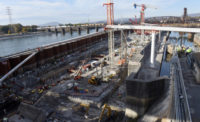President Bush's fiscal year 2008 budget proposal has welcome news for some federal construction programs but disappointing numbers for others.
 Shealah Craighead Bush budget proposal faces tough sledding. |
Transmitted to Congress Feb. 5, the plan recommends increases for highways, mass transit, and other accounts, but also seeks to clamp down on growth in non-defense, non-homeland security areas. That means cuts in programs such as water infrastructure and airport grants.
The major policy news accompanying the columns of numbers is the administration's proposal to overhaul the aviation financing system. The overhaul would shift to a program based mostly on fuel taxes and user fees and eliminate current aviation excise taxes.
Bush said at a Feb. 5 cabinet meeting that his $2.9-trillion budget plan "is realistic, it's achievable, and it's got good reforms in it."
But the release of the proposal is only the opening move in the lengthy contest over federal spending for the next fiscal year. The White House recommendations face a steep, uphill path on Capitol Hill, because both houses of Congress have Democratic majorities for the first time in the Bush presidency. In coming months, Democrats undoubtedly will scrutinize the budget and make changes in the numbers Bush has proposed.
Among the winning construction programs in Bush's 2008 budget are surface transportation programs covered by the 2005 SAFETEA-LU measure. They include the federal-aid highway program, which would get a 1% hike, to $39.6 billion, and the Federal Transit Administration, which would see funding climb 5%, to $9.4 billion, compared with levels contained in the fiscal 2007 spending package pending in Congress.
But over all, the budget blueprint proposes holding non-security domestic discretionary spending to a 1% increase in 2008. To keep to that cap while booting some programs, the White House has proposed a bunch of cuts. They include slicing Environmental Protection Agency water infrastructure 15%, to $2.7 billion, and trimming airport construction grants 21%, to $2.8 billion.
Among federal buildings accounts, General Services Administration new construction would receive $615 million, down 22% from the pending appropriations package. Dept. of Veterans Affairs major construction would jump 82%, to $727 million.
Along with what the administration terms the "base budget," Bush also is asking Congress for two more large infusions of supplemental funds, mostly to continue the war in Iraq. He is seeking $93.4 billion in additional 2007 appropriations plus $141.7 billion in emergency supplemental spending for 2008 for defense and other programs for the administration's "Global War on Terror."


Post a comment to this article
Report Abusive Comment